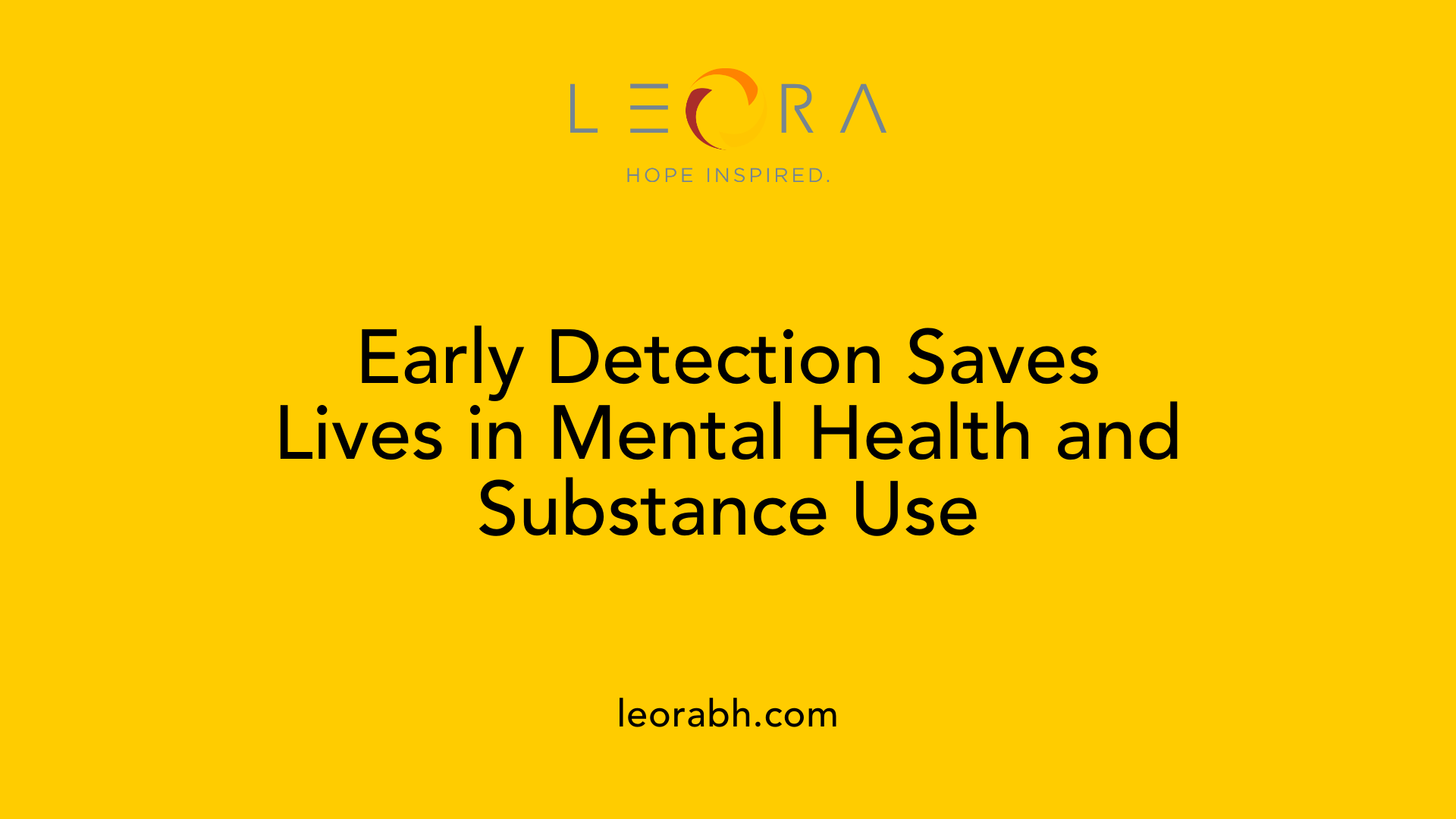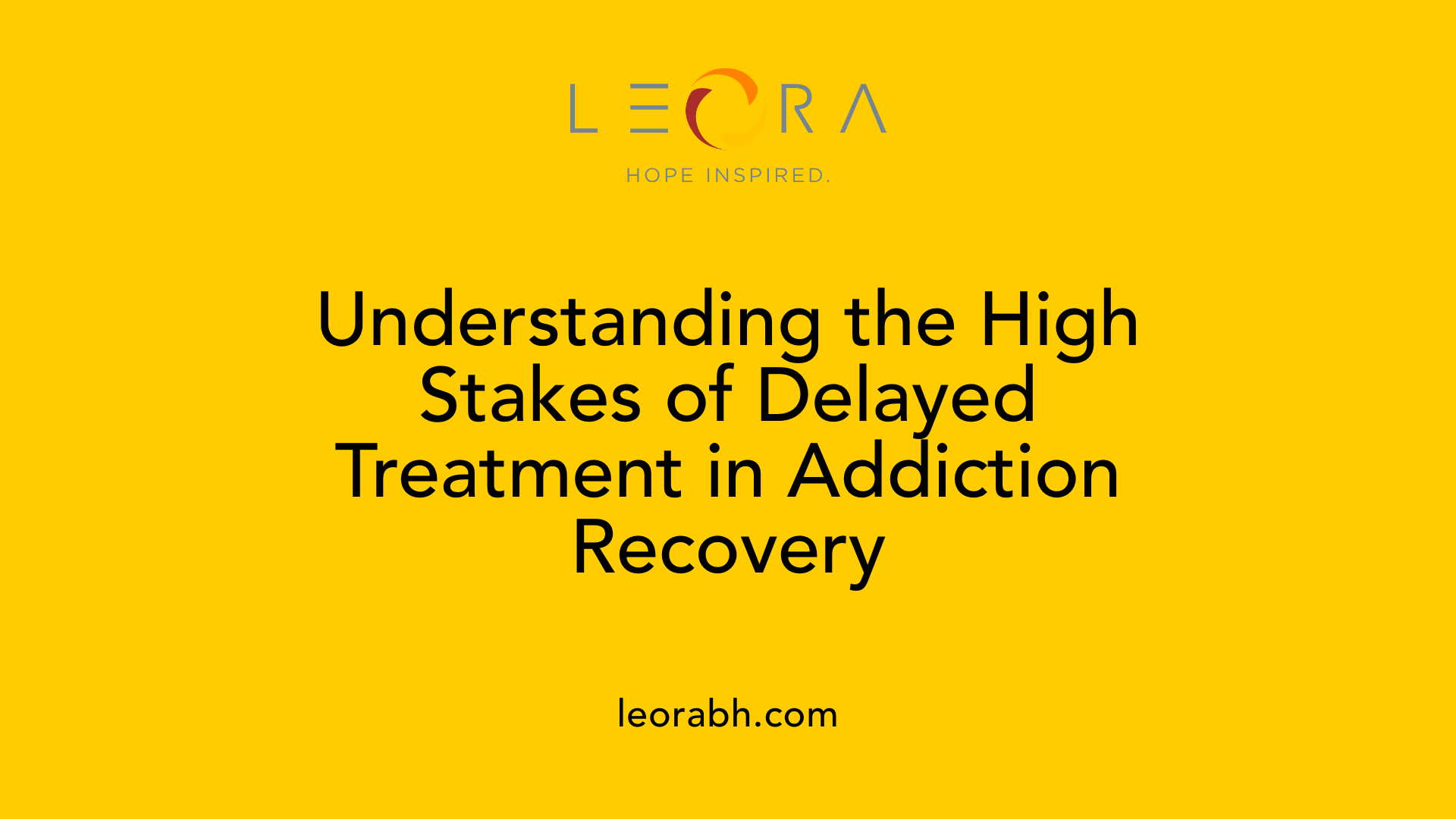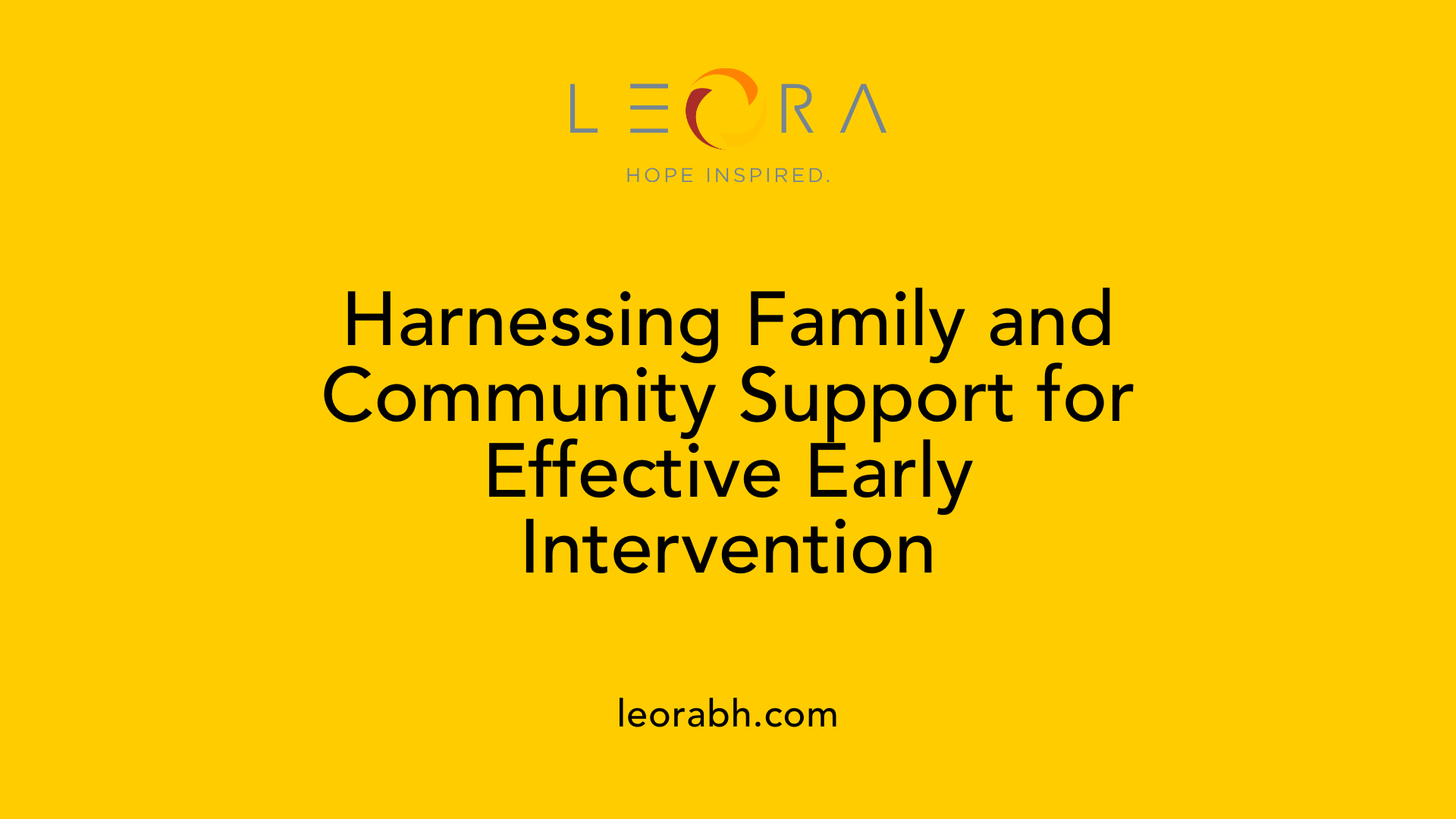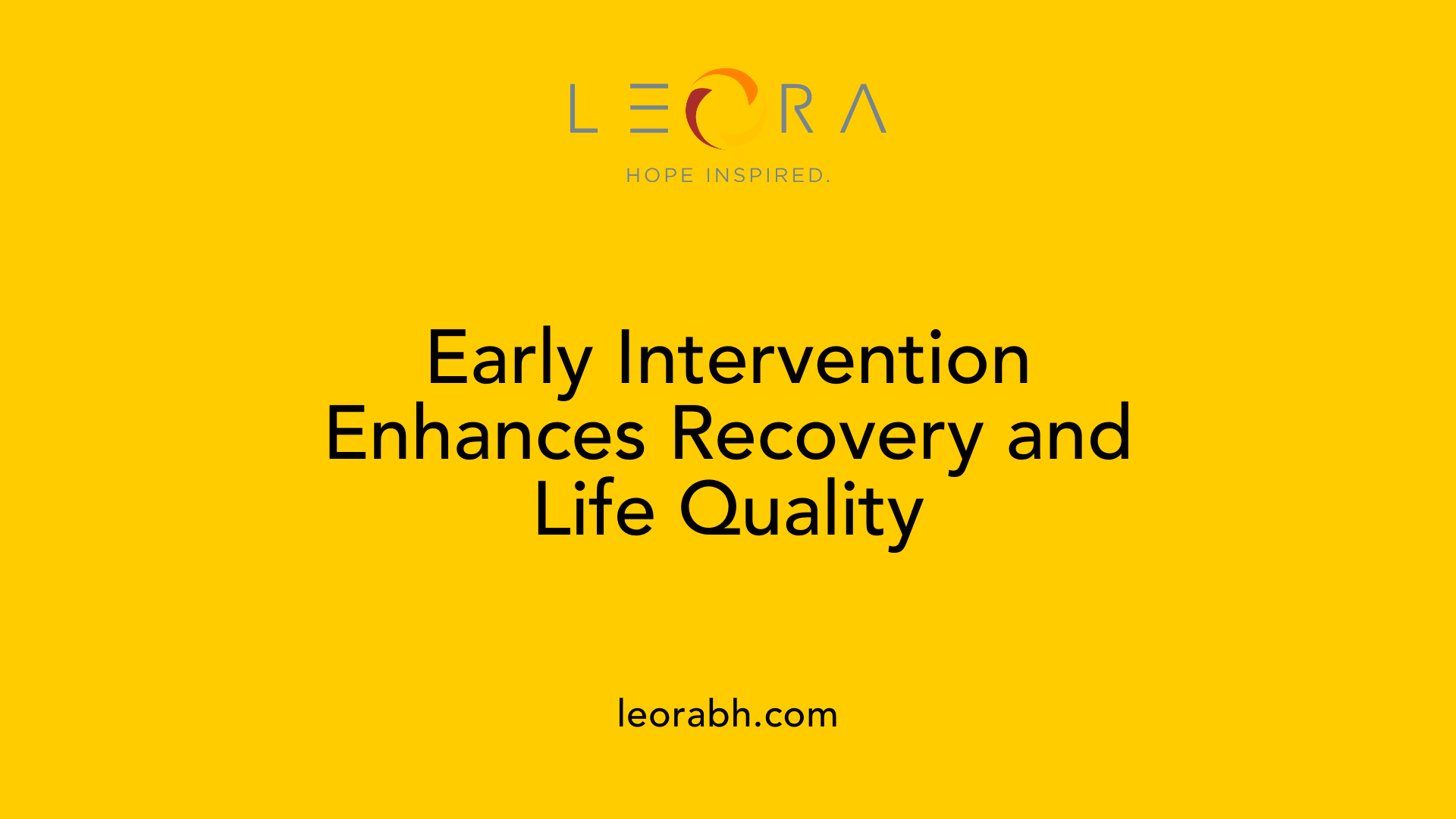Why Early Intervention Matters in Substance Use Disorders
The Critical Role of Timely Action in Combating Substance Use
Understanding the Power of Early Intervention
Substance use disorders (SUDs) are a complex and progressive health issue that affects millions worldwide. The importance of early intervention cannot be overstated, as it has the potential to transform outcomes, prevent escalation, and save lives. This article explores why early detection and intervention are vital, emphasizing strategies, evidence, and the collaborative efforts needed to address substance misuse effectively.
Recognizing Early Signs and Implementing Preventive Measures

What are early warning signs and preventive measures for substance misuse?
Early warning signs of substance misuse often include behavioral and physical changes. Individuals may develop increased tolerance and experience cravings, leading them to take larger amounts or use substances longer than intended. Withdrawal symptoms can also appear when not using, indicating physical dependence. Behavioral signs include neglecting responsibilities at work or school, withdrawal from social activities, and engaging in risky behaviors such as driving under the influence.
Physical indicators might include changes in appearance, weight fluctuations, poor hygiene, or signs of health issues like liver or heart problems. In adolescents, signs can be more subtle but may involve secretive behaviors, mood swings, or sudden academic decline.
Preventive strategies hinge on education about the health risks associated with substance misuse and fostering open communication within families. Talking honestly about substance risks helps create awareness and reduces stigma, making it easier for individuals to seek help early. Promoting healthy environments, providing accurate information about medication management, and developing skills to resist peer pressure are also crucial.
Supporting mental health and teaching healthy stress management techniques can prevent substance misuse from developing. Support services such as counseling, self-help groups, and community helplines are essential tools in early intervention efforts. These resources empower individuals to address concerns before problems escalate, ultimately reducing long-term health and social consequences.
The Critical Importance of Early Detection in Mental Health and Substance Use

Why is early detection and intervention important in mental health disorders?
Early detection and intervention play a vital role in managing mental health and substance use issues effectively. When problems are identified at their initial stages, treatment can be initiated promptly, preventing the development of more severe symptoms or chronic conditions. Recognizing early signs such as mood changes, behavioral shifts, or physical symptoms allows healthcare professionals to intervene before the disorder becomes deeply ingrained, leading to better long-term prognosis.
Timely intervention is associated with numerous benefits, including improved treatment success rates, increased chances of recovery, and reduced social and emotional impacts. For example, early support can help individuals develop healthy coping mechanisms, minimize damage to relationships, and prevent escalation into serious health complications like heart disease, liver damage, or mental health comorbidities.
Advancements in technology are enhancing our ability to monitor mental health continuously. Tools like artificial intelligence and data analysis platforms, such as Emotii, track emotional and behavioral patterns across various data sources — from social media activity to wearable devices. This constant data flow enables early warning signs to be identified more quickly, facilitating timely interventions.
Early intervention also reduces stigma around mental health issues by normalizing ongoing, proactive care and encouraging open discussions. When individuals and communities understand the importance of addressing symptoms early, they are more likely to seek help without fear of judgment.
Ultimately, detecting mental health and substance use concerns early empowers personalized treatment plans aligned with each individual's specific needs. This approach not only enhances recovery chances but also strengthens overall quality of life, helping individuals navigate life's challenges with resilience.
Why Addressing Substance Use Early Is Vital for Successful Recovery

Why is early intervention important for substance use disorder?
Early intervention in substance use disorder (SUD) is essential because it targets the problem at its initial stages before it can develop into a more complex, chronic illness. Detecting risky behaviors early allows healthcare providers to intervene before a person’s condition worsens, reducing health, social, and functional impairments.
Research shows that substance use disorders are progressive if left untreated. Early intervention can prevent casual or mild substance use from escalating into addiction, thus avoiding long-term health issues such as liver or heart damage, mental health disorders, and neurological impairments.
By addressing substance misuse early, interventions can be more effective, often involving brief advice or behavioral therapies like Cognitive Behavioral Therapy (CBT) and Motivational Interviewing. In addition, medications approved for conditions like alcohol or opioid use can be more successful when used in the early stages.
Early steps in intervention also help contain costs, reduce the strain on healthcare systems, and minimize societal consequences like crime, legal issues, or strained relationships. Overall, the goal is to promote healthier lifestyles, improve quality of life, and support long-term recovery.
Progression of untreated SUDs
When untreated, substance use disorders tend to worsen over time. Initial casual use can evolve into dependence, with increased substance intake and tolerance. This progression heightens the risk of overdose, chronic health problems, and mental health issues.
The longer intervention is delayed, the harder it becomes to treat the disorder effectively. Untreated addiction often leads to significant social and personal consequences, including damaged relationships, employment difficulties, and legal problems.
Risks of escalation
If not addressed early, substance misuse can escalate into full-blown addiction, characterized by compulsive use despite harmful outcomes. Escalation increases the likelihood of serious health complications such as liver disease, cardiovascular problems, and neurological damage.
It can also lead to risky behaviors like drunk driving, violence, or criminal activity. Mental health can further deteriorate, with anxiety, depression, or co-occurring disorders becoming more difficult to manage.
Effectiveness of early clinical intervention
Clinical interventions at early stages—such as screening, brief advice, and targeted therapies—are proven to be highly effective. They often lead to better treatment outcomes, including higher sobriety rates and lower relapse risks.
Strategies like Screening, Brief Intervention, and Referral to Treatment (SBIRT) enable healthcare providers to identify and support at-risk individuals efficiently. Combining behavioral therapies with medications enhances the chances of recovery.
Long-term health and social benefits
Early intervention not only improves immediate health outcomes but also offers lasting social benefits. Preventing the escalation of substance misuse preserves family relationships, supports educational and employment stability, and reduces involvement with the justice system.
It can also prevent the development of co-occurring mental health conditions and decrease the societal costs related to healthcare, legal issues, and loss of productivity.
By addressing substance misuse early, individuals have a better chance of maintaining sobriety and reintegrating successfully into their communities, fostering healthier, more resilient lives.
| Aspect | Effect | Additional Details |
|---|---|---|
| Progression | From casual use to dependence | Early intervention halts this process, reducing health risks |
| Risks of escalation | Serious health, mental, and social problems | Timely care reduces these risks substantially |
| Treatment effectiveness | Higher success rates | Especially with combined therapies and medications |
| Long-term benefits | Improved health and social stability | Including stronger relationships and safer communities |
Understanding the importance of early intervention highlights why proactive screening, awareness, and prompt treatment are vital components in managing substance use disorders effectively.
Effective Strategies for Implementing Early Intervention

What are effective strategies for implementing early intervention in substance use disorders?
Implementing early intervention effectively requires a combination of systematic screening, brief motivational efforts, preventive programs, and community involvement. Screening and assessment in various healthcare settings are crucial first steps. Using validated tools like questionnaires and interviews, healthcare providers can quickly identify individuals at risk of developing more severe substance use disorders.
Brief motivational interventions, such as motivational interviewing, help individuals recognize their substance use risks and develop internal motivation to change. The widely used SBIRT model—Screening, Brief Intervention, and Referral to Treatment—embodies this approach, offering a structured method to engage at-risk individuals, provide motivational advice, and connect them with further care if needed.
Education plays a vital role as well. Informing individuals about safe use, potential risks, and strategies for reduction or cessation can increase awareness and promote healthier choices. When necessary, linking individuals to specialized treatment programs ensures that those with more advanced issues receive appropriate care.
Preventive programs grounded in scientific evidence and psychosocial theories target reducing substance use initiation, particularly among youth. School-based life skills training, community-wide campaigns, and family-oriented interventions help build resilience, improve decision-making, and prevent escalation.
Community and family involvement enhances these efforts. Coordinated actions across sectors, policy initiatives, and public awareness campaigns foster a supportive environment for early intervention. Engaging families provides emotional backing and reinforces positive behavioral changes, while community resources broaden access to screening and treatment services.
By combining these strategies—timely screening, motivational support, evidence-based prevention, and active community participation—early intervention can be scaled effectively, helping to curb the development of substance use disorders before they become severe.
Scientific Evidence Supporting Early Intervention Effectiveness
 Research consistently supports the notion that catching substance use and mental health issues early leads to better treatment outcomes. Studies show that early intervention can significantly reduce the severity of symptoms and improve overall functioning. For example, community-based programs, school interventions, and family support initiatives have demonstrated success in preventing the progression of substance misuse among adolescents and young adults.
Research consistently supports the notion that catching substance use and mental health issues early leads to better treatment outcomes. Studies show that early intervention can significantly reduce the severity of symptoms and improve overall functioning. For example, community-based programs, school interventions, and family support initiatives have demonstrated success in preventing the progression of substance misuse among adolescents and young adults.
Screening tools like questionnaires and brief interviews are effective in identifying individuals at risk before problems fully develop. When healthcare providers implement strategies such as Motivational Interviewing and brief advice during routine visits, they can motivate individuals to consider change early on, reducing the likelihood of the disorder becoming chronic.
The impact of early intervention extends beyond immediate symptoms. It can prevent secondary issues such as mental health disorders, self-harm, or legal problems. By addressing issues at an early stage, healthcare systems can reduce long-term costs associated with treatment of advanced conditions and complicated recoveries.
Treatment success rates improve when individuals receive timely help. Behavioral therapies, combined with medications where appropriate, are more effective at this stage. The overall goal is to halt the progression of disease, minimize relapse, and support healthier development.
In summary, scientific research underscores that early intervention in substance use and mental health disorders can prevent long-term disability, decrease relapse rates, and foster sustained recovery. Proactive screening, community education, and accessible treatment services play crucial roles in realizing these benefits, making early intervention an essential component of health strategies.
Risks of Delayed Treatment and Societal Costs

What are the risks and consequences of delayed treatment in addiction recovery?
Choosing to delay treatment for substance use problems can have serious repercussions on health, social life, and legal standing. One of the most critical risks is the development of severe health complications. Untreated addiction can lead to organ damage, such as liver disease, cardiovascular problems, and neurological impairments. Mental health conditions like anxiety and depression often worsen when addiction remains unaddressed, creating a cycle that makes recovery even more difficult.
In addition to physical and mental health issues, delayed intervention often results in social and legal consequences. Relationships with family, friends, and colleagues may become strained or broken. Social isolation can deepen, making support systems less effective. Legal troubles, including arrests or incarceration, may also arise from behaviors associated with untreated substance misuse, such as driving under the influence or engaging in illegal activities to sustain drug use.
The longer addiction persists without intervention, the more challenging long-term treatment becomes. People are more likely to experience higher relapse rates, and the damage to health and social relationships can be irreversible. Emotional stress and anxiety tend to escalate, further complicating recovery efforts. Early treatment helps prevent these issues, improving the likelihood of lasting sobriety, better health outcomes, and social functioning.
In summary, postponing addiction treatment increases the risk of serious health decline, ruptured relationships, legal problems, and enduring social disconnection. Prompt action is essential to protect individuals from these extensive consequences and to foster a path toward sustainable recovery and improved quality of life.
The Role of Family and Community in Early Intervention

How can family, friends, and the community support early intervention efforts?
Families, friends, and the community play a crucial role in ensuring early intervention is successful. They can support these efforts by actively engaging in a child's daily routines and activities, which provides natural opportunities for learning and development. For example, participating in play, reading together, or assisting with homework can help identify early signs of developmental concerns.
Collaboration is vital. Families can work closely with early intervention providers by sharing observations about the child's behavior and progress. Participating in planning sessions and implementing agreed-upon strategies tailored to the child's and family's specific needs can make interventions more effective.
Trust and respect are fundamental. Building a trusting relationship with service providers and respecting cultural values and family strengths empower families and foster greater engagement in intervention services.
Community support also enhances early intervention outcomes. Schools, libraries, local community groups, and health organizations can raise awareness of developmental signs. They can advocate for policies that support early screening and intervention, and create inclusive opportunities for children with special needs.
Overall, active involvement, open communication, and sustained support from both families and the broader community strengthen early intervention efforts. This ongoing support helps children reach their full potential and reduces the likelihood of developmental delays and related challenges.
Preventing Progression and Social Harm through Early Action

How does early intervention help prevent the progression of substance use disorders and related health and social problems?
Early intervention plays a vital role in stopping substance use problems from escalating into full-blown addiction or causing serious health and social issues. It begins with screening, which can be integrated into routine healthcare, school programs, or community outreach, allowing detection of risky behaviors before they become severe. Once identified, brief advice, motivational interviewing, and targeted interventions can motivate individuals to change their behaviors early.
Scientific research supports the use of strategies like SBIRT (Screening, Brief Intervention, and Referral to Treatment), which has proven effective in reducing risky substance use. These early steps often prevent the development of more severe disorders, saving individuals from long-term health complications like liver disease, heart problems, or mental health disorders.
Beyond health benefits, early treatment enhances social functioning by helping individuals maintain relationships, employment, and educational pursuits. It also reduces societal costs associated with healthcare expenditures, legal issues, and lost productivity. Since untreated substance use can lead to criminal activity, family conflicts, and mental health challenges, acting early significantly diminishes these adverse social consequences.
Overall, prompt intervention fosters healthier communities by addressing issues early, creating a healthier future for individuals and society alike.
The Significance for Recovery and Quality of Life

Why is early intervention significant in addressing mental health issues related to substance use?
Early intervention plays a vital role in promoting both mental and physical well-being for individuals facing substance use problems. By identifying warning signs and initiating treatment at the earliest possible stage, it is possible to prevent the issue from worsening into a chronic disorder. This proactive approach not only helps in managing substance use but also minimizes the development of co-occurring mental health conditions such as anxiety or depression.
When intervention occurs early, individuals tend to experience better long-term outcomes. Treatment is more effective and often less intensive, reducing the physical damages caused by prolonged substance use, such as organ damage or neurological impairments. Mentally, early support helps in establishing healthier coping mechanisms, which can significantly reduce feelings of hopelessness and improve overall psychological health.
Furthermore, early intervention can prevent secondary consequences like strained relationships, legal issues, and social isolation. It fosters greater awareness and reduces stigma, encouraging individuals to seek help without fear of judgment. Addressing issues promptly creates a supportive environment that enhances recovery prospects, bolsters emotional resilience, and promotes sustained sobriety.
Studies show that individuals receiving early treatment respond more positively, with higher chances for lasting recovery and shorter treatment durations. Implementing early intervention strategies in healthcare settings, schools, and community programs can thus significantly improve a person’s quality of life, paving the way for healthier, more fulfilling lives.
| Benefits of Early Intervention | Impact on Health | Related Support Strategies |
|---|---|---|
| Prevents escalation of problems | Reduces physical health damage | Routine screening in clinics and schools |
| Enhances mental health recovery | Supports mental resilience | Family involvement and community resources |
| Improves treatment outcomes | Minimizes emotional distress | Education and awareness campaigns |
| Lessens social and legal consequences | Supports social integration | Motivational interviewing and brief advice |
| Promotes long-term sobriety | Prevents relapse | Continued follow-up and support |
Moving Forward with Proactive Strategies
Incorporating early intervention approaches in healthcare, education, and community settings is essential to effectively combat substance use disorders. By prioritizing early detection, fostering supportive environments, and engaging families and communities, we can prevent the escalation of misuse and facilitate recovery. Continued research, policy support, and accessible services are crucial to sustaining these efforts, ultimately safeguarding individual well-being and public health.
References
- EARLY INTERVENTION, TREATMENT, AND MANAGEMENT ... - NCBI
- Why Early Intervention is So Important in Addiction Treatment
- Why Early Intervention Matters in Alcohol Treatment - Bold Health
- Evidence-Based Interventions for Preventing Substance Use ...
- The Importance of Early Intervention in Addiction Treatment
- Early Intervention for Substance Use Disorders - WebMD
- Effectiveness of early interventions for substance-using adolescents
- The Power of Early Intervention in Mental Health: A Pathway to ...
- The Importance of Early Intervention in Substance Abuse
- The Importance of Early Intervention in Substance Abuse
Find Your Inner Light
Related Articles
Schedule an Assessment
Leora Behavioral Health provides comprehensive treatment services, including ambulatory detox, mental health IOP, and SUD IOP, to support your journey toward lasting recovery.
Our caring team will guide you through the admissions process and create a personalized treatment plan tailored to your unique needs. We welcome walk-ins. If you or a loved one is struggling, reach out today. We’re here to help.


.svg)




.svg)
.svg)
.svg)
.svg)
